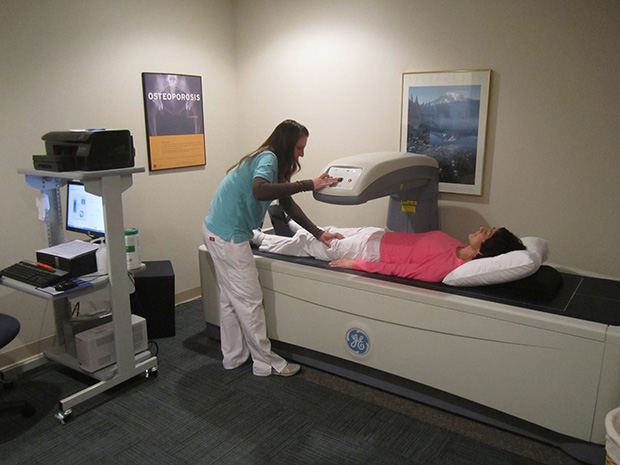
Submitted by Genesis Imaging Center
What do you know about Osteoporosis? You’ve probably never considered bone loss and how it could affect your daily routine. National Osteoporosis Month is the perfect time for you to bone up on your bone health.
What is osteoporosis?
Osteoporosis is a bone disease that causes the bones to become weak and brittle. Your bones are living tissues that go through the process of regrowth throughout your lifespan. Osteoporosis occurs when your body loses too much bone or does not create enough bone. Bone loss may seem like a small problem, but weakened bones are prone to serious fractures from even the minor events.
Are you at risk?
You’ve probably heard that osteoporosis only affects older women. While Caucasian women over the age of 50 are at a higher risk, the disease impacts men and women of all races and ages.
According to the National Osteoporosis Foundation (NOF), one in two women and one in four men will break a bone in their lifetime due to osteoporosis.1 Fortunately, we can strengthen our bodies against osteoporosis and bone loss at a young age.
You can prevent bone loss
The process to keep your bones strong and healthy begins as a young adolescent and continues as you age.
Here are some ways you can help protect your bones.
- Fuel your body with enough calcium and Vitamin D. Include foods such as yogurt, green vegetables, fortified juices, or cereals and milk into your diet. Some people take vitamin supplements if necessary.
- Move your bones by exercising regularly. Brisk walks, resistance or muscle-strengthening exercises, and group exercise classes are excellent ways to boost your bone health.
- Kick poor health habits to the curb. Quit smoking and limit the amount of alcohol and processed foods you consume each day.
- Schedule a bone density scan (DEXA) to determine your bone health.
What is a bone density scan, and do you need it?
A bone density scan is the established standard for measuring bone mineral density and bone loss. It also determines whether you are at risk for future fractures. The painless exam lasts about 10 minutes. Schedule an appointment with your doctor to discuss your bone health and risk for osteoporosis. The NOF recommends that you have a bone density scan if you meet any of the following criteria:
- Are a woman age 65 or older
- Are a man age 70 or older
- Break a bone after age 50
- Are a woman of menopausal age with risk factors
- Are a postmenopausal woman under age 65 with risk factors
- Are a man between ages 50 and 69 with risk factors
A bone density scan may also be necessary if you have any of the following symptoms:
- An X-ray of your spine showing a break or bone loss in your spine
- Back pain with a possible break in your spine
- Height loss of half an inch or more within one year
- Total height loss of one-and-a-half inches from your original height
Talk to your doctor to see if a bone density scan is right for you.
The Genesis Imaging Centers, located in Davenport, Bettendorf, and Moline, offer convenient and on-time bone density scans to patients in the Quad Cities area. If you need to schedule a bone density exam, call 563-421-XRAY (9729) or 309-281-5000.
To learn more about how to protect your body against bone loss or Osteoporosis, visit the National Osteoporosis Foundation at nof.org.
If you have questions about the services offered at Genesis Imaging Centers, please contact Physician Liaison Amanda Geffre at
563-421-5632 or geffrea@genesishealth.com.
Orginal article: 1 National Osteoporosis Foundation
“General Facts” National Osteoporosis Foundation. Retrieved March 21, 2017 from https://www.nof.org/preventing-fractures/general-facts/

